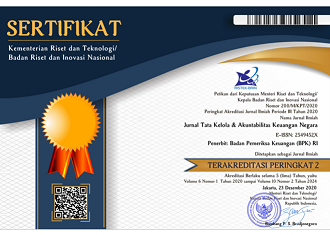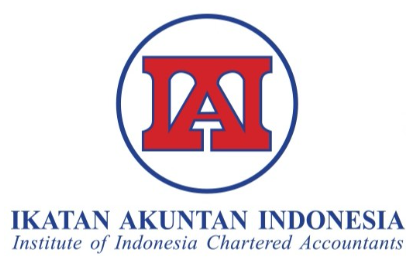SUPERIOR AUTHORITY AND FRAUDULENT IN PROCUREMENT OF GOODS/SERVICES: THE ROLE OF CODE OF ETHICS
DOI:
https://doi.org/10.28986/jtaken.v5i2.374Keywords:
Superior authority, code of ethics, fraudulent acts, goods and service procurementAbstract
An increase in the number of corruption cases in the goods and services procurement at government agencies in Indonesia causes the country to suffer significant losses. This condition proves the noncompliance of the goods and services procurement officials with the code of ethics for the implementation of goods and services procurement. Corruption cases in the goods and services procurement tend to involve goods and services procurement officials, both as Budget User Authorities, Commitment Making Officials, and Technical Implementation Activities Officials. In other words, officials (superiors) use their authority to commit fraud in the goods and services procurement. The purpose of this study is to determine and evaluate the role of the code of ethics on the influence of superior authorities on fraudulent acts in goods and services procurement of government agencies in Indonesia. This study used the laboratory experiments method with the accounting students of Pattimura University, Ambon as the participants and a two-way ANOVA with a 2x3 factorial experimental design as a data analysis technique. The results of this study show that superior authority plays an important role in influencing the occurrence of fraudulent acts in the goods and services procurement, and a code of ethics can reduce it. There is a difference in the tendency to commit fraud in the goods and services procurement when there is a superior authority and no superior authority. The tendency to commit fraud will be smaller for individuals who are asked to read the code of ethics and signatures it compared to only reading the code of ethics and without a code of ethics.References
Bandura, A. (1991). Social cognitive theory of moral thought and action. In W. M. Kurtines & J. L. Gewirtz (Eds.), Handbook of Moral Behavior and Development Volume 1: Theory (pp.45-101). Hillsdale, NJ: Erlbaum.
Bandura, A. (1999). Moral disengagement in the perpetration of inhumanities. Personality and Social Psychology Reviews, 3(3), 193-209. doi: 10.1207/ s15327957pspr0303_3
Bawa, A. A., & Yasa, G. W. (2016). Efek moderasi locus of control pada hubungan otoritas atasan dan kecurangan akuntansi. E-Jurnal Ekonomi dan Bisnis Universitas Udayana, 5(5), 1057-1086.
Cressey, D. R. (1953). Other people’s money: A study in the social psychology of embezzlement. New Jersey: Montclair Patterson Smith.
Indonesia Corruption Watch. (2016). Tren penanganan kasus korupsi tahun 2016. Retrieved from https:// antikorupsi.org/sites/default/files/ tren_penindakan_kasus_korupsi_201 6_1.pdf
Indonesia Corruption Watch. (2017). Tren penanganan kasus korupsi tahun 2017. Retrieved from https:// antikorupsi.org/sites/default/files/ laporan_tren_penindakan_kasus_kor upsi_2017.pdf
Indonesia Corruption Watch. (2018). Tren penanganan kasus korupsi tahun 2018. Retrieved from https:// antikorupsi.org/sites/default/files/
laporan_tren_penindakan_kasus_kor upsi_2018.pdf
Liyanarachi, G., & Newdick, C. (2009). The impact of moral reasoning and retaliation on whistle-blowing: New Zealand evidence. Journal of Business Ethics, 89(1), 37-57. doi: 10.1007/s10551-0089983-x
Mayhew, B. W., & Murphy, P. R. (2014). The impact of authority on reporting behavior, rationalization and affect. Contemporary Accounting Research, 31 (2), 420-443. doi: 10.1111/19113846.12037
Milgram, S. (1974). Obedience to authority an experimental view. USA: Harper & Row Publisher Inc.
Nahartyo, E. (2013). Desain dan implementasi riset eksperimen edisi 2. Yogyakarta: UPP STIM YKPN.
Nahartyo, E., & Utami, I. (2015). Panduan praktis riset eksperimen. Jakarta: Indeks.
Narsa, N. P. D. H. R., & Supriyadi. (2017). Peran kode etik perusahaan dalam memitigasi perilaku eskalasi manajer berbingkai teori keagenan. Prosiding Simposium Nasional Akuntansi XX. Jember, Indonesia.
Otoritas Jasa Keuangan. (2014). Roadmap tata kelola perusahaan Indonesia: menuju tata kelola emiten dan perusahaan publik yang lebih baik. Jakarta: OJK.
Payne, D. M., Corey, C., Raiborn, C., & Zingoni, M. (2019). An applied code of ethics model for decision-making in the accounting profession. Management Research Review, 3(2), 113-129. doi: 10.1108/MRR-10-2018-0380
Regulations of the Head of Buleleng Regency Number 8 of 2018 code of ethics for the goods and services procurement in the procurement services division.
Sitanala, T. F. (2019). Can the internal control system reduce fraudulent use of village funds in adverse selection condition?. Jurnal tata Kelola & Akuntabilitas Keuangan Negara, 5(1), 37-56. doi: 10.28986/jtaken.v5i1.294
Sofyani, H., & Pramita, Y. D. (2015). Otoritas atasan, retaliasi dan locus of control sebagai faktor-faktor yang memengaruhi perilaku manipulasi Laporan Realisasi Anggaran. Jurnal Reviu Akuntansi dan Keuangan, 5(2), 427436.
Sofyani, H., & Rahma, N. (2015). Pengaruh pendidikan karakter keagamaan dan otoritas atasan untuk berbuat curang terhadap perilaku tidak etis akuntan. Jurnal Akuntansi dan Keuangan Indonesia, 12(2), 106-122. doi: 10.21002/ jaki.2015.07
Tehupuring, R., & Lingga, R. A. (2017). Sistem pengendalian intern sebagai prediktor kecurangan akuntansi pada pemerintah daerah. Dapatkah loyalitas individu memitigasinya. Jurnal Tata Kelola & Akuntabilitas Keuangan Negara, 3(2), 113-129. doi: 10.28986/ jtaken.v3i2.111
Tuanakotta, T. M. (2013). Audit Berbasis ISA (International Standard on Auditing). Jakarta: Salemba Empat.
West, A. (2018). Multinational tax avoidance: Virtue ethics and the role of accountants. Journal of Business Ethics, 153(4), 1143-1156. doi: 10.1007/s10551 -016-3428-8
Bandura, A. (1999). Moral disengagement in the perpetration of inhumanities. Personality and Social Psychology Reviews, 3(3), 193-209. doi: 10.1207/ s15327957pspr0303_3
Bawa, A. A., & Yasa, G. W. (2016). Efek moderasi locus of control pada hubungan otoritas atasan dan kecurangan akuntansi. E-Jurnal Ekonomi dan Bisnis Universitas Udayana, 5(5), 1057-1086.
Cressey, D. R. (1953). Other people’s money: A study in the social psychology of embezzlement. New Jersey: Montclair Patterson Smith.
Indonesia Corruption Watch. (2016). Tren penanganan kasus korupsi tahun 2016. Retrieved from https:// antikorupsi.org/sites/default/files/ tren_penindakan_kasus_korupsi_201 6_1.pdf
Indonesia Corruption Watch. (2017). Tren penanganan kasus korupsi tahun 2017. Retrieved from https:// antikorupsi.org/sites/default/files/ laporan_tren_penindakan_kasus_kor upsi_2017.pdf
Indonesia Corruption Watch. (2018). Tren penanganan kasus korupsi tahun 2018. Retrieved from https:// antikorupsi.org/sites/default/files/
laporan_tren_penindakan_kasus_kor upsi_2018.pdf
Liyanarachi, G., & Newdick, C. (2009). The impact of moral reasoning and retaliation on whistle-blowing: New Zealand evidence. Journal of Business Ethics, 89(1), 37-57. doi: 10.1007/s10551-0089983-x
Mayhew, B. W., & Murphy, P. R. (2014). The impact of authority on reporting behavior, rationalization and affect. Contemporary Accounting Research, 31 (2), 420-443. doi: 10.1111/19113846.12037
Milgram, S. (1974). Obedience to authority an experimental view. USA: Harper & Row Publisher Inc.
Nahartyo, E. (2013). Desain dan implementasi riset eksperimen edisi 2. Yogyakarta: UPP STIM YKPN.
Nahartyo, E., & Utami, I. (2015). Panduan praktis riset eksperimen. Jakarta: Indeks.
Narsa, N. P. D. H. R., & Supriyadi. (2017). Peran kode etik perusahaan dalam memitigasi perilaku eskalasi manajer berbingkai teori keagenan. Prosiding Simposium Nasional Akuntansi XX. Jember, Indonesia.
Otoritas Jasa Keuangan. (2014). Roadmap tata kelola perusahaan Indonesia: menuju tata kelola emiten dan perusahaan publik yang lebih baik. Jakarta: OJK.
Payne, D. M., Corey, C., Raiborn, C., & Zingoni, M. (2019). An applied code of ethics model for decision-making in the accounting profession. Management Research Review, 3(2), 113-129. doi: 10.1108/MRR-10-2018-0380
Regulations of the Head of Buleleng Regency Number 8 of 2018 code of ethics for the goods and services procurement in the procurement services division.
Sitanala, T. F. (2019). Can the internal control system reduce fraudulent use of village funds in adverse selection condition?. Jurnal tata Kelola & Akuntabilitas Keuangan Negara, 5(1), 37-56. doi: 10.28986/jtaken.v5i1.294
Sofyani, H., & Pramita, Y. D. (2015). Otoritas atasan, retaliasi dan locus of control sebagai faktor-faktor yang memengaruhi perilaku manipulasi Laporan Realisasi Anggaran. Jurnal Reviu Akuntansi dan Keuangan, 5(2), 427436.
Sofyani, H., & Rahma, N. (2015). Pengaruh pendidikan karakter keagamaan dan otoritas atasan untuk berbuat curang terhadap perilaku tidak etis akuntan. Jurnal Akuntansi dan Keuangan Indonesia, 12(2), 106-122. doi: 10.21002/ jaki.2015.07
Tehupuring, R., & Lingga, R. A. (2017). Sistem pengendalian intern sebagai prediktor kecurangan akuntansi pada pemerintah daerah. Dapatkah loyalitas individu memitigasinya. Jurnal Tata Kelola & Akuntabilitas Keuangan Negara, 3(2), 113-129. doi: 10.28986/ jtaken.v3i2.111
Tuanakotta, T. M. (2013). Audit Berbasis ISA (International Standard on Auditing). Jakarta: Salemba Empat.
West, A. (2018). Multinational tax avoidance: Virtue ethics and the role of accountants. Journal of Business Ethics, 153(4), 1143-1156. doi: 10.1007/s10551 -016-3428-8
Downloads
Submitted
2019-10-03
Accepted
2019-12-05
Published
2019-12-26
How to Cite
Sitanala, T. F. (2019). SUPERIOR AUTHORITY AND FRAUDULENT IN PROCUREMENT OF GOODS/SERVICES: THE ROLE OF CODE OF ETHICS. Jurnal Tata Kelola Dan Akuntabilitas Keuangan Negara, 5(2), 139–155. https://doi.org/10.28986/jtaken.v5i2.374
Issue
Section
Articles
License

Jurnal Tata Kelola dan Akuntabilitas Keuangan Negara is licensed under
a Creative Commons Attribution-ShareAlike 4.0 International License




















